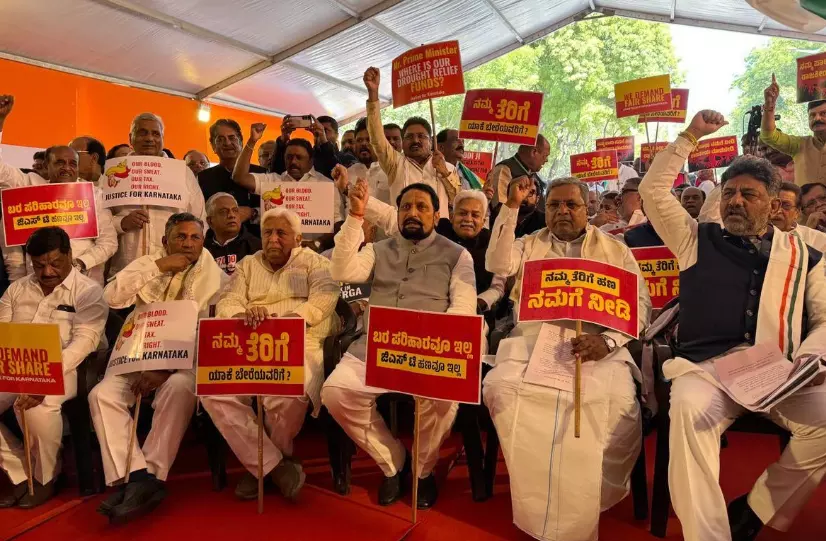
- Home
- India
- World
- Premium
- THE FEDERAL SPECIAL
- Analysis
- States
- Perspective
- Videos
- Sports
- Education
- Entertainment
- Elections
- Features
- Health
- Business
- Series
- In memoriam: Sheikh Mujibur Rahman
- Bishnoi's Men
- NEET TANGLE
- Economy Series
- Earth Day
- Kashmir’s Frozen Turbulence
- India@75
- The legend of Ramjanmabhoomi
- Liberalisation@30
- How to tame a dragon
- Celebrating biodiversity
- Farm Matters
- 50 days of solitude
- Bringing Migrants Home
- Budget 2020
- Jharkhand Votes
- The Federal Investigates
- The Federal Impact
- Vanishing Sand
- Gandhi @ 150
- Andhra Today
- Field report
- Operation Gulmarg
- Pandemic @1 Mn in India
- The Federal Year-End
- The Zero Year
- Science
- Brand studio
- Newsletter
- Elections 2024
- Events
- Home
- IndiaIndia
- World
- Analysis
- StatesStates
- PerspectivePerspective
- VideosVideos
- Sports
- Education
- Entertainment
- ElectionsElections
- Features
- Health
- BusinessBusiness
- Premium
- Loading...
Premium - Events

While most other states in the Union give a little or take a little, Uttar Pradesh corners the bulk of India’s resources. This puts a strain on southern and western states, which are the givers
India was set up as a union of states for historical reasons. It adopted the Westminster System of Democracy as an erstwhile British colony. Except, the scale of the country in terms of the number of divergent states, and the size of each state, and the vastness of each constituency magnify the flaws of that system.
How individual representatives are elected, how they come together to form a government, and how policy gets made after government formation are all elements of the system; each of those skews the system away from decentralisation and closer to a unitary form of government. These elements also weaken the transmission of the will of the people while strengthening political parties and their leadership.
Increasing threat to federal structure?
In the last 75 years since Independence, these fears of a systemic shift towards an increasingly unitary government, one that doesn’t serve the needs of vast swaths of people, and the states they inhabit, have become a little more real with each passing year. The chief ministers of southern states protesting in the streets of Delhi for devolution of funds – an unprecedented event in the history of independent India – is one data point in a long list of such historical injustices meted to states.
Southern India, as a more prosperous part of the country, contributes significantly more to the exchequer than it receives in return. This comes on top of the population having stabilised in the southern states, which makes the problem worse, given the allocation of resources taking population as its basis.
South, west give, but UP gets lion’s share
What the chief ministerof Karnataka was especially piqued about was the enormous positive residual for Uttar Pradesh that dwarfs every other state, in the above chart. While most other states in the Union give a little or take a little, Uttar Pradesh corners the bulk of India’s resources. This puts a strain on southern and western states, which are the givers. Particularly, on the states of Karnataka, Tamil Nadu and Gujarat. Gujarat, and by virtue of being politically aligned with the Union at this time, has chosen not to complain now. Narendra Modi, however, had raised the complaint a decade ago when he was the chief minister of the state and when the shoe was on the other foot.
Most citizens in India’s southern states would agree to some equalisation, as a principle. That the richer states contribute a little to help the poorer ones to some extent. It’s the extreme nature of it that makes it problematic. The parameters are set arbitrarily, as if to punish success. Citizens pay taxes and vote to elect their governments so as to decide how to use that tax money. They seek to influence the policies on health and education and local administration to improve how their society is run. The taxes that citizens in these southern states pay, though, are subject to a fulcrum that shifts much of it to the northern plains and violates that basic social contract of a liberal democracy.
Why states should get more funds
A simple way to understand this is to look at the Union government’s budget. The expenditure by the Union government on what it calls its 'core',’ ‘core of the core’, and ‘major schemes’ totals over ₹5 lakh crore. Over 80 percent of all these schemes happen to be either explicitly state subjects or what ought to be a state subject, which the Union usurped. The total devolution, meanwhile, for all states combined, is ₹2.21 lakh crore. That is the problem.
That the Union government owns what funds and policy positions should ideally reside with the states is the most important problem to address. We should have a society that knows the pain of paying for its important priorities, which is exactly how progress happens. A good example of that effect is how Tamil Nadu paid for its Mid-Day Meal scheme by increasing its sales tax in the 1980s.
To be sure, some additional funds for poor states can and should be made available. But we cannot have a situation where a majority of a given state is from transfers in the name of equalisation. Especially when the state is highly populated. It’s no one’s case that Arunachal Pradesh, a sparsely populated mountainous and forested state, should not get its funds through transfers; it’s that when states like Bihar and Uttar Pradesh, two of the most populous states, get a bulk of their budget funded through transfers, it becomes problematic.
Delhi, acting like London, is a problem for all states. That some states are politically aligned with Delhi at the moment may make it seem beneficial for them, but power has a strange way of abandoning friends in its own pursuit.
(The Federal seeks to present views and opinions from all sides of the spectrum. The information, ideas or opinions in the articles are of the author and do not necessarily reflect the views of The Federal.)


